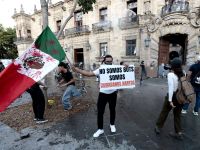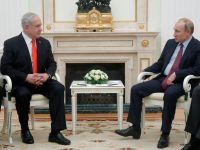Israeli and Palestinian delegates traded accusations as a rare special session of the UN's top human rights body got under way in Geneva Tuesday to discuss the deadly violence between Palestinians and Israelis.
Arab and Muslim countries, which called for the session, want the United Nations Human Rights Commission to set up an international commission of inquiry to investigate "the causes and perpetrators" of the clashes.
Palestine's Permanent Observer to the UN here, Nabil Ramlawi, said "a continuous massacre" had been taking place since Israeli opposition leader Ariel Sharon "stormed" Jerusalem's Al-Aqsa mosque compound on September 28.
The visit has provoked the eruption of nearly three weeks of fierce clashes throughout the West Bank and Gaza Strip, which has led to the loss of 110 lives, mostly Palestinian, and up to 3,000 injured.
Ramlawi said Israel had carried out crimes "which fall under crimes of ethnic cleansing, crimes of racism, crimes of war and crimes against humanity".
Israeli authorities have imposed "all forms of collective punishment" on the Palestinian people, he said, including a military blockade of towns and cities, adding that those responsible should face trial in accordance with international conventions.
Addressing the Commission, Israel's new ambassador to the UN, Yaakov Levy, condemned the lack of a "clear and unequivocal" call from Palestinian leader Yasser Arafat to end the violence.
"By launching this continuous wave of violence under the flimsiest of pretexts, Mr. Arafat took upon himself the responsibility of plunging the entire region into a period of instability with unpredictable consequences," he told the Commission.
Levy added he could not think of a worse time for the special session to take place, adding that what was needed at this stage was "a supreme diplomatic effort" to end the hostilities.
The session could at best be counterproductive by distracting from efforts to end the violence, he said, and at worst provide more "inflammatory rhetoric which could spill over into the area".
The session, expected to last two days, is only the fifth of its kind in the history of the UN Commission on Human Rights.
Israel had earlier rejected demands by Arafat for an international commission of inquiry into how the violence erupted.
But Tunisian Ambassador Hatem Ben Salem, speaking on behalf of Arab and Muslim states, insisted Tuesday: "We invite this Commission to investigate the causes of and responsibility for crimes committed against Palestinians."
The UN body, which usually meets annually for six weeks from March to April, should also propose "measures and means conducive to preventing this treatment in future", he added.
Arab countries want UN Human Rights High Commissioner Mary Robinson to carry out an urgent visit to the Palestinian territories, as well as all the body's special rapporteurs.
Robinson, addressing the Commission, said an independent inquiry may help resolve issues, and consideration was needed over the appropriate entity to conduct it. But she also urged delegates to give careful consideration to the future.
"I have already said that the route to the protection of human rights lies through the conclusion of a just and durable peace," she said.
She added: "It may be that the Commission is the appropriate body, or it may mandate a human rights component to participate in or support such an inquiry under other auspices."
Until now, the UN Commission on Human Rights has only met in special session four times -- twice in 1992 to discuss Yugoslavia, in 1994 on Rwanda and last September to discuss East Timor - GENEVA (AFP)
© 2000 Al Bawaba (www.albawaba.com)







